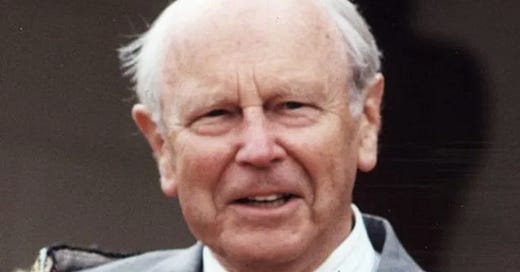I’m saddened to learn of the death of Sir Michael Hardie Boys, New Zealand’s Governor-General from 1996 to 2001. I never met him, but, as a small tribute, below is a passage from an article published in 2015 which acknowledges the crucial role he played in the transition to proportional representation.
“Sir Michael Hardie Boys, Governor-General from 1996 to 2001, gave a series of speeches on the conventions of government-formation. Sir Michael’s advice was clear: government-formation and the choice of who is to lead as Prime Minister are to be arrived at by the political parties themselves through their negotiations. The public statements and agreements made by the political parties should clarify where the majority support of the House lies. The Governor-General may communicate with party leaders to clarify matters, but his or her role is not to take part in government-formation negotiations. Once there is ‘clear and public evidence that the necessary political agreement had been reached, and that a government could be formed which had the support of the new Parliament’ (Hardie Boys, 1998, p. 73), then the Governor-General’s duties to appoint the Prime Minister and other ministers can be undertaken. In the meantime, the incumbent Prime Minister remains in office under the caretaker convention. Above all, the Governor-General should not be drawn into making (or even influencing) the political choice as to who should govern. The eight weeks of negotiations following the 1996 election required a steady hand from Sir Michael. A coalition agreement between the National and New Zealand First parties was reached in time for the first sitting of the new parliament. Under Section 19 of the Constitution Act 1986, ‘Parliament shall meet not later than 6 weeks after the day fixed for the return of the writs’ from the preceding election. Sir Michael described this date as ‘an informal deadline’ for the coalition negotiations (Hardie Boys, 1997).
“Sir Michael set out some limits to the role of reserve powers and indicated what is required before the power to appoint a Prime Minister is exercised. Amendments to Chapter 6 of the Cabinet Manual incorporated these points about government formation in order to clarify matters publicly and to provide guidance in the future. Writing these conventions down in an authoritative guide for the executive requires clear and unambiguous statements. It may run the risk of privileging one interpretation of convention over another, or of facilitating certain developments in constitutional practice, while possibly impeding changes to others. Government formation under MMP often looks like a messy political arrangement, but, constitutionally, it has been concluded successfully on six [now ten] occasions thus far.”
Sir Michael played a very significant, yet appropriately restrained, role in New Zealand’s system of government through a difficult time. His guidance has had a lasting influence.
Hardie Boys, M. (1997) ‘Continuity and Change: The 1996 General Election and the Role of the Governor-General’, Waikato Law Review, 5, 1–16.
Hardie Boys, M. (1998) ‘The Role of the Governor-General Under MMP’. In Simpson, A. (ed.) The Constitutional Implications of MMP, Wellington, School of Political Science and International Relations, Victoria University of Wellington, pp. 63–77.
Duncan, G. (2015) ‘New Zealand's Cabinet Manual: How Does It Shape Constitutional Conventions?’, Parliamentary Affairs, 68, 4, pp. 737–756, https://doi.org/10.1093/pa/gsu023




